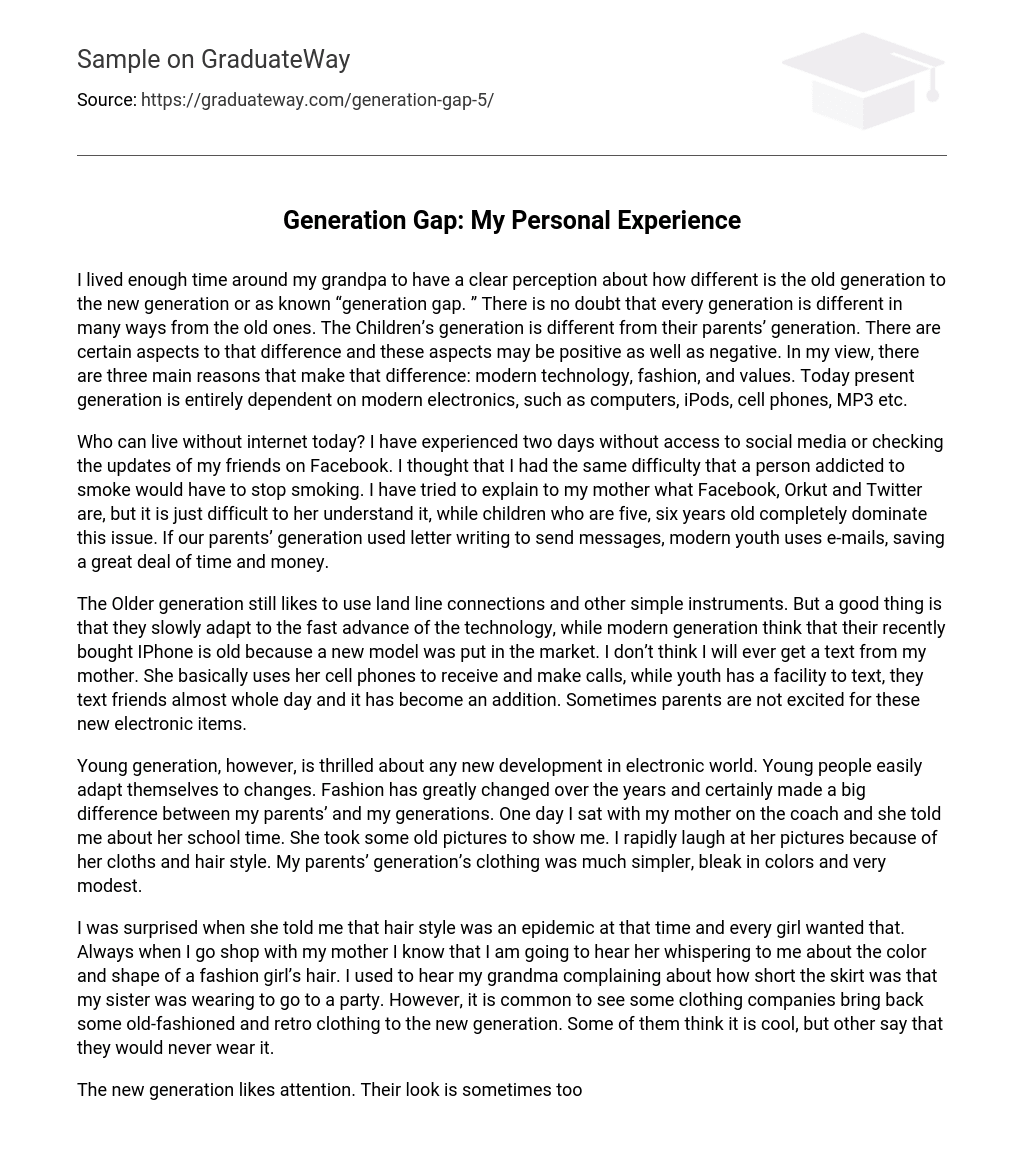Living with my grandpa has provided me with a deep understanding of the “generation gap,” emphasizing the stark contrast between older and newer generations. It is undeniable that each generation differs from its predecessors in various ways. The younger generation distinguishes itself from their parents’ generation through both positive and negative aspects. In my opinion, three key elements contribute to this difference: technological progress, fashion trends, and value systems. Currently, the present generation heavily depends on contemporary electronic devices like computers, iPods, cell phones, and MP3 players.
In today’s world, it is hard to imagine life without the internet. I personally experienced a two-day struggle when I couldn’t access social media or keep up with my friends’ posts on Facebook. It felt like trying to quit smoking for someone who is addicted. Explaining platforms such as Facebook, Orkut, and Twitter to my mother has been difficult as she struggles to understand them, whereas even young children fully grasp these platforms. Unlike our parents who relied on letter writing for communication, younger people rely on emails which are more time and cost efficient.
Both the older and younger generations have differing technology preferences. The older generation prefers landline connections and simple devices, but they are gradually adapting to technological advancements. On the other hand, the younger generation quickly considers their newly bought iPhone outdated as soon as a new model is launched. Personally, I don’t anticipate receiving texts from my mother because she primarily uses her cell phone for calls. In contrast, young people constantly send text messages to their friends throughout the day, which has almost become addictive for them. It’s not unusual for parents to lack excitement towards these new electronic gadgets.
The younger generation is enthusiastic about advancements in the electronic world. They are quick to adapt to changes. Fashion has transformed significantly over the years, creating a noticeable distinction between my parents’ generation and mine. While sitting with my mother on the couch one day, she shared stories from her school days and showed me old pictures. I couldn’t help but laugh at her outfits and hairstyle. Compared to my parents’ generation, their clothing was simpler, with more subdued colors and a modest appearance.
I was surprised to learn from her that the hair style at that time was considered an epidemic, with every girl wanting to have it. Whenever I go shopping with my mother, I expect her to whisper to me about the color and style of a fashionable girl’s hair. My grandma used to always complain about how short my sister’s party skirt was. However, it is now common to see clothing companies reintroducing old-fashioned and retro clothing to appeal to the new generation. Some people find it cool, while others would never consider wearing it.
The new generation prefers attention and their appearance can be excessively flashy and daring, while their style tends to be immodest. One crucial contrast between the old and new generation is the perception of value. Nowadays, with advancements in science, young people have embraced a spirit of curiosity and questioning. They no longer want to blindly accept pre-established beliefs. Instead, they are filled with hopes and ambitions, driven to move forward without considering the repercussions. When elders offer advice, they often feel irritated, mutter, and complain. By nature, the youth are sensitive individuals.
The contemporary youth no longer find traditional values and established traditions appealing. They now reside in an era of questioning and experimentation. When elders attempt to control and enforce their desires upon them, the young generation resists and rebels. They experience frustration and discontent when their wishes go unfulfilled. Today’s youth disregards teachers’ guidance and disobeys parental authority due to a wounded sense of self-respect. I acquired knowledge from my mother regarding her experiences during her younger years.
Recalling her childhood, my mother used to say that her father had a unique way of communicating instructions without words. A mere glance from him was enough for her to understand and be prepared to obey. She also observed how teachers at school played a parental role in shaping students’ behavior. Similar to their own parents, students held great respect for their teachers and obediently followed their guidance. Even today, my mother vividly remembers the practice initiated by her father; he insisted on all children gathering together at mealtimes as an expression of gratitude for the food they received each day.
Many times I witnessed my grandma arguing with her daughters about her grandchildren arguing with their parents. The grandchildren desired to go on a trip that their parents didn’t permit or they wanted to buy something and required the money immediately. The older generation tends to be more patient, as they were raised with strict rules and boundaries. On the other hand, the younger generation lacks patience and dislikes waiting. They may refuse to sit together for dinner or decline to partake in the traditional customs of their families.
Today’s young people prioritize their own interests, parties, and games over values, finding them boring. This creates a gap between our generation and that of our parents. Modern technology, fashion, and values drive this divide. It is crucial for youth to comprehend and adjust to the older generation to prevent future remorse.
Both parents and children have the potential to learn from each other. Children can educate their parents on new electronics, while parents can provide assistance with shopping for clothes and offer sincere opinions, acknowledging their distinct viewpoints. The most effective approach for parents to instill values in their children is by spending more time together. Unfortunately, busy schedules frequently hinder families from even sharing a meal due to work, school, and numerous extracurricular activities. By giving importance to quality time, we can collectively progress and inspire one another in shaping a better future.





